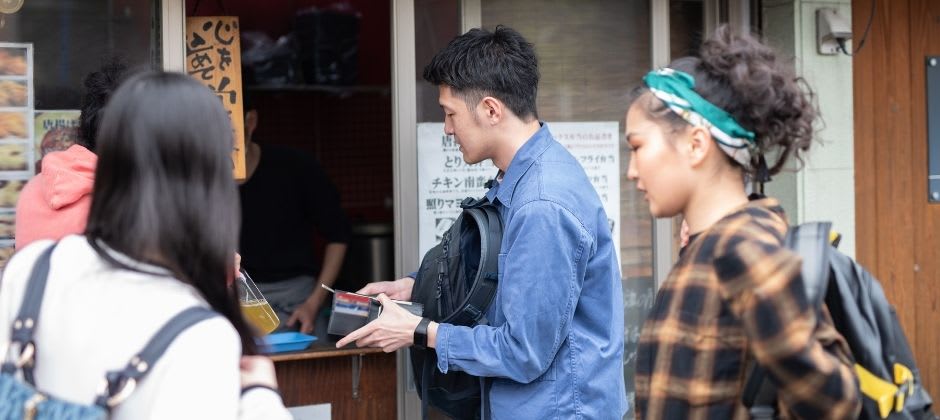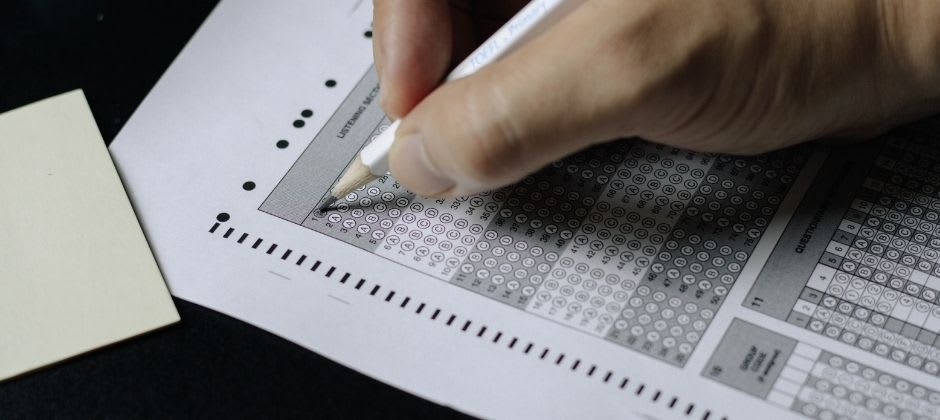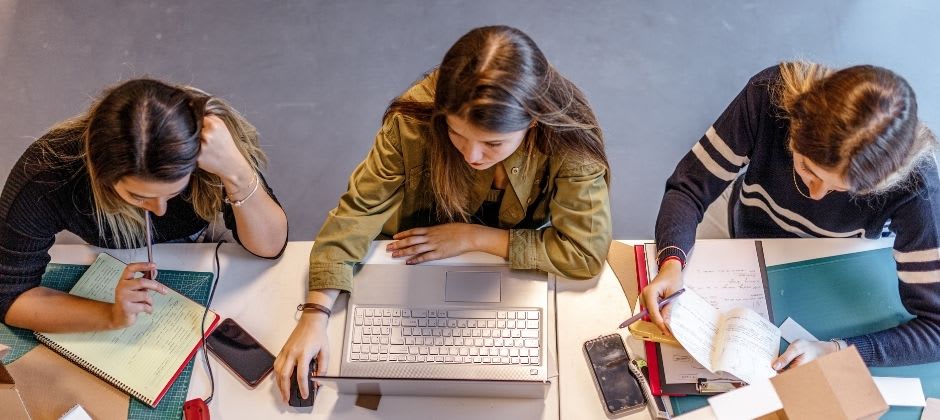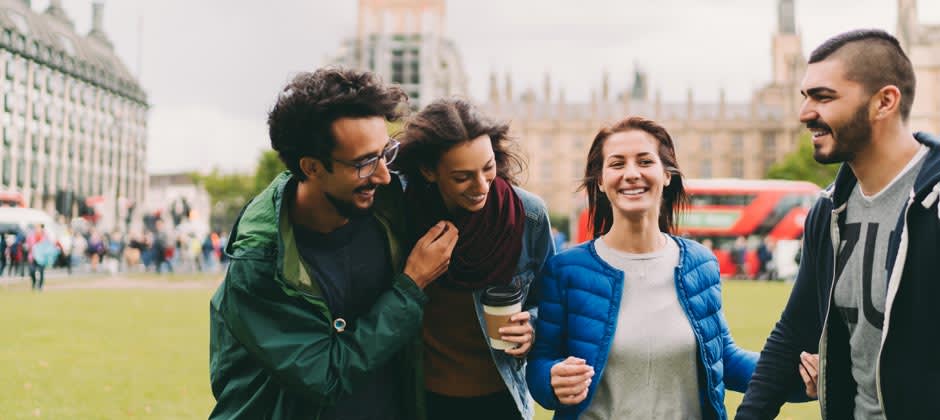How to Study Abroad Guide: Preparing for Study Abroad
Once you’ve officially accepted an offer, it’s time to do the logistical work of preparing to make the move. Read on to learn how to prepare for studying abroad: how to find housing, budget, and pack for your trip!
- Preparing to Study Abroad
- Study Abroad Financing

Once you’ve officially accepted an offer, it’s time to do the logistical work of preparing to make the move. This can be very overwhelming, so we’ve broken down each thing you’ll need to do step by step. Read on to learn how to find housing, budget, and pack for your trip!
Need info about country-specific housing and living costs?
Use our country guides to find what you need.
1. Find housing
Some programs will provide you with housing or make the arrangements for you. If that’s the case, you’re very lucky! For those who need to know how to find housing abroad, here are the different types of accommodation you’ll encounter when you’re a student abroad:
Student dormitories
Student dorms are great in that they’re furnished and provide you with instant access to people your age. Socially, this is an ideal scenario! In terms of privacy, you will likely be giving up a little alone-time. All dorms are different, but you may share a room and will likely share a kitchen and a bathroom. Check with your university to see what they offer. Dorms can be a good value, as they're often reasonably priced and are close to campus.
Homestays
Homestays are an excellent option for international students who want to immerse themselves in the local culture. You’ll get a real experience by living with a local or a local family and can get the benefit of their wisdom and advice. These places are also already furnished which are ideal for those who will only be in the country temporarily. Of course, you will have to give up some privacy. But it could be well worth it if you want to integrate yourself into the culture more quickly. Not sure where to start? Homestay.com is a good starting place. Your school may also be able to put you in touch with homestay options.
Apartments
Apartments are great for those comfortable with more independence. Of course, depending on where you live, your apartment complex could have lots of students which may make it as social as a student dorm. Apartments can be expensive though, so you may have to get a roommate or two.
Apartment-hunting can also be tricky to navigate when you’re not able to visit apartments before making a decision. If you won’t be able to visit a third-party rental before you arrive, be check out these common rental scams and how to avoid them.
Things to keep in mind when looking for housing abroad
Prioritize your safety by choosing to live in a neighborhood that's well-known to be a safe area. Ask current students or search online to find the safer areas of your destination. Just because an apartment is cheap doesn’t mean it’s worth sacrificing your sense of well-being over it! You can also look into temporarily staying in a backpacker's hostel or in an Airbnb while you search for the right housing.
2. Make a budget

Managing your money is one of the most difficult things to do abroad. With so many new experiences at your fingertips, it’s easy to lose track. Your budget will vary based on where you study abroad, and there’s definitely no one-size-fits-all budget as some countries are more affordable than others. You should absolutely make the most of your study abroad experience, but you can do it in a reasonable way that’s within your budget!
Some basic budget tips to help you save money abroad
Bring your student ID everywhere
Many countries offer student discount cards, and often bringing your student ID around can get you into museums and other tourist attractions at a reduced price. Many stores and restaurants will offer discounts for students too!
Prepare meals at home
Eating out can add up really quickly. If you’re on a small budget, cooking the majority of your meals at home is a great way to save money. You can still take advantage of local foods, but preparing them at home will cut major costs.
Find free activities
Sure, many things do cost money, but you’d be surprised at the number of things you can do for free! You'll likely find tons of no-cost things to do in your destination, including outdoor activities like hiking and swimming as well as visiting museums, libraries, and festivals. Schools usually also have student clubs and social activities that you can attend for little or no cost.
Check your budget often
Making an ambitious budget before you leave can’t hurt, but you should revise once you get to the country and get a better sense of what things will cost. Be sure to regularly check your bank account or get an app that can help you track spending. When you’re not used to foreign currency, you might be spending more than you think you are.
Research cheap ways to travel
If you want to travel even more during your study abroad period, research wallet-friendly ways to do it. There are many budget airlines around, and trains, buses, and ferries can be great too. For inner-city travel, you might consider investing in a bicycle. It’s great exercise and might be cheaper than other options besides walking.
3. What to pack
Is your flight date approaching? Better get serious about packing! Every region will require different items to bring, and you can also buy many items once you get there. Below is our ultimate packing list, optimized for 6 months abroad regardless of location. Feel free to customize the list according to your own needs!
The Ultimate Study Abroad Packing List
🗺️ Travel Essentials
- Passport and a photocopy
- Student visa
- Local currency if needed
- Credit cards with a travel notice
- Medical prescriptions with an original copy of the prescription
- Health insurance
- Vaccine pass or test certificate
- Student ID
- Driver’s license
- Wallet
- Snacks for the journey
*Pro-tip: Leave a photocopy of your passport, visa, credit cards, insurance information, and licenses with someone you trust at home in case something gets lost or stolen.
🎒 Clothing, Shoes, and Accessories
Tops:
- 2-3 tank tops
- 4-5 short sleeve shirts
- 2-3 long sleeve shirts
- 1 light jacket
- 1 sweatshirt
- 2-3 sweaters (light and heavy)
- 1 rainjacket
Bottoms:
- 14 pairs of underwear
- 1-2 pairs of tights
- 4 pants, including jeans
- 1-2 shorts
Other Outfits:
- 2 pajamas
- 1 formal outfit
- 2 athletic outfits
- 1 swimsuit
Optional:
- 3 bras
- 2 sports bras
- 2-3 dresses
- 2 skirts
Shoes:
- 1 pair of athletic shoes
- 1 pair of comfortable walking shoes
- 1 pair of dressier shoes
- 1 pair sandals
- 12 pairs of socks
Accessories:
- Hat
- Purse
- Tote bag
- Backpack
- Umbrella
- Sunglasses
- Reusable water bottle
- Jewelry
Location Dependent:
- Cold:
- 1 heavier jacket
- 1 scarf
- 1 pair gloves
- 1 pair of boots
- Warm:
- 1 pair flip-flops
🧼 Toiletries
Bathroom supplies take up a lot of space in a suitcase, so only bring small travel sizes to last you a week or two until you can buy new stuff in your destination country. Here’s a list of what you should bring with you and what you should buy when you get there:
Bring from home:
- Toothbrush
- Toothpaste (travel size)
- Sunscreen (travel size)
- Eyeglasses and contacts
- Contact solution (travel size)
- Hairbrush
- A few hair ties and clips
- Tweezers
Bring if you need a specific brand:
- Deodorant or antiperspirant
- Makeup
- Skincare items
- Menstrual and sanitary items
Buy there:
- Shampoo
- Conditioner
- Body wash
- Lotion
- Laundry detergent
- Toothpaste
- Sunscreen
- Contact solution
- Bandages
- Hand sanitizer
- Razors
- Nail care
- Bug spray
🔌 Tech
- Laptop or tablet and charger
- Phone and charger
- Power adapter or converter
- Cloud access or flash drive
- Headphones
- Power bank or portable phone charger
- Camera and charger
- USB cable
Remember that even if you might forget something as you are organizing your trip abroad, you will likely be able to find something similar once you arrive! You may even find some new favorites of international brands to bring back with you.
How to Study Abroad Guide: Overview
We know it's difficult to get started. In this guide, we’ll explain how to study abroad in full, from how to pick a program to how to bounce back from homesickness, and everything in between!
Why Study Abroad?
There are so many reasons why study abroad programs are life-changing experiences for many international students. Learn more about how studying abroad can help build your future.
What Can I Study Abroad?
Wondering about what you can study abroad? This section of the How to Study Abroad Guide will talk about the different kinds of degrees and programs you can study overseas.
What to Do When You Arrive
Do you have your ticket abroad but need to know what to do on arrival? Learn how to navigate your first few days in a new country and also what to expect as you are adjusting to a new culture and society.
After Study Abroad
So, you have had an incredible adventure and are looking at your options after your time is up? We have some ideas for you. Find out more about how to put study abroad on your resume, and what to do if you want to stay in your study abroad country.

Author
The Keystone Team is comprised of experienced educators and advisors dedicated to providing valuable resources and advice to students all over the world.
Read related articles

These Exams Could Help Make Your Study Abroad Dream a Reality

How to Study Abroad Guide: What Can I Study Abroad?
